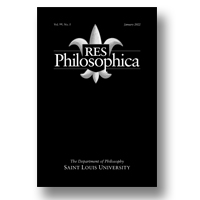|
articles |
|
1.
|
Res Philosophica:
Volume >
96 >
Issue: 1
Eleonore Stump
Introduction
view |
rights & permissions
| cited by
|
|
|
|
|
2.
|
Res Philosophica:
Volume >
96 >
Issue: 1
Andrew Pinsent
Spell-Breaking with Revitalizing Metaphors
abstract |
view |
rights & permissions
| cited by
Growing public interest in the dark arts, and the fact that even some philosophers have been accused of casting spells with their own writings, suggest that philosophers should not wholly neglect the topics of spells and spell-breaking. In this paper, written in honor of an effective spell-breaker in social and leadership contexts, Fr Theodore Vitali, I set out a taxonomy of spells and ways in which some philosophers may be said to cast them in a naturalistic sense. I also examine ways of breaking a spell, with reference to the will and second-person relationship. I conclude with a brief observation about the desire for intellectual completeness, the root of a disordered appeal of at least some spells to their victims, suggesting an alternative scenario for a good satisfaction of this desire.
|
|
|
|
|
3.
|
Res Philosophica:
Volume >
96 >
Issue: 1
Kevin Timpe
Moral Ecology, Disabilities, and Human Agency
abstract |
view |
rights & permissions
| cited by
This paper argues that human agency is not simply a function of intrinsic properties about the agent, but that agency instead depends on the ecology that the agent is in. In particular, the paper examines ways that disabilities affect agency and shows how, by paying deliberate attention to structuring the social environment around people with disabilities, we can mitigate some of the agential impact of those disabilities. The paper then argues that the impact of one’s social environment on agency isn’t restricted only to those agents that have disabilities, but also characterizes all human agency. All of our agency is environmentally dependent.
|
|
|
|
|
4.
|
Res Philosophica:
Volume >
96 >
Issue: 1
Adam Green
The Transmission of Understanding
abstract |
view |
rights & permissions
| cited by
There is a substantial literature in epistemology concerning whether knowledge can be transmitted. So-called generative cases of testimony seem to show that testimony cannot transmit knowledge. This article defends the thesis that knowledge transmission by testimony is possible. Once one thinks more carefully about the model of transmission we are employing, however, the stage is set for two surprising results. Supposed counter-examples to knowledge transmission feature transmission in the relevant sense, and, more surprisingly, it is possible to transmit understanding, even when we are construing understanding as an internalist good.
|
|
|
|
|
5.
|
Res Philosophica:
Volume >
96 >
Issue: 1
Timothy Pawl
In Defense of Divine Truthmaker Simplicity
abstract |
view |
rights & permissions
| cited by
In his recent article “Against Divine Truthmaker Simplicity,” Noël Saenz has provided two careful arguments for the falsity of a theory of divine simplicity which he dubs “Divine Truthmaker Simplicity.” In this brief response, I criticize his two arguments, arguing that neither is sound.
|
|
|
|
|
6.
|
Res Philosophica:
Volume >
96 >
Issue: 1
Jennifer Hart Weed
Thomas Aquinas and the Baptism of Desire
abstract |
view |
rights & permissions
| cited by
Thomas Aquinas argues that baptism is necessary for salvation. However, he entertains a scenario described by Ambrose of Milan, such that Emperor Valentinian II converted to Christianity and was intending to be baptized but died before the sacrament could be performed. Aquinas argues that the Emperor could have achieved salvation without being baptized with water because he desired baptism and that desire was the result of his faith in God. In this paper, I offer a short treatment of Aquinas’s view of baptism, his handling of the Valentinian II case, and his arguments concerning the efficacy of the baptism of desire. I conclude with a brief discussion of Aquinas’s treatment of the case of Cornelius the centurion, which illustrates how Aquinas’s view of baptism of desire and implicit faith can apply to those individuals who have no access to or connection with the Church.
|
|
|
|
|
7.
|
Res Philosophica:
Volume >
96 >
Issue: 1
Victor Salas
Rodrigo de Arriaga, S.J. (1592-1667), on Analogy and the Concept of Being
abstract |
view |
rights & permissions
| cited by
This paper considers Rodrigo de Arriaga’s account of the nature of the concept of being, which he construes in terms of univocity in opposition to analogy. I argue that the reason for his preference of univocity follows from his commitment to formal (as opposed to objective) precision. This commitment to formal precision comes at a price, however. Though Arriaga insists on restricting the concept of being to ‘real being’ only, it is not clear how he is able to maintain that restriction in a principled way. Like his contemporary and confrere, Richard Lynch, Arriaga seems to be on a trajectory that will lead to a supertranscendental conception of metaphysical science.
|
|
|
|






